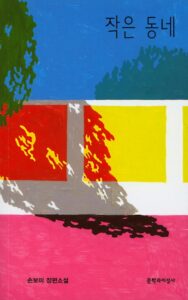2020 Participants
Ji-in Choi
Past Program / 2020 Program / Ji-in Choi
INTERVIEW VIDEO
| Countrty | Korea |
| Name | Ji-in Choi |
| Publishers | Moonji Publishing Company |
| jiin@moonji.com |
| Company | |
| Moonji Publishing Company was established in 1975. The company name, Moonji is an abbreviation of Moonhak (文學) and Jiseong (知性) which mean literature and Intelligence. Despite of the suppression of the press and the censorship during the dictatorship, Moonji had kept the autonomy of literature, public concern and humanistic intelligence as its values. Moonji, founded by four literary critics – Kim Hyoun , Kim Byoung-Ik, Kim Chi-Soo and Kim Joo-Youn, has since been operated as a community of members from various generations, and has maintained the idea that Moonji belongs to a literary community, not to a specific individual. Literary Fiction과 Non-fiction, Now Moonji’s place is assured as a small but time-honored publisher having published more than 3,000 titles in literary fiction, non-fiction, poetry, academic books and children’s books. |
ARTICLE
Publishing in the Post-Pandemic Era
The Era of Pandemic: Stagnation of the Market and Rise of Noncontact Distribution
It is said that publishing suffers relatively little damage compared to other fields of arts and culture like films, performances and exhibition, however, stagnation of overall publishing market was inevitable. According to the report of sales of more than 600,000 companies analyzed by Korea Credit Data, sales on books decreased by 16% from Feb. 10 to Apr. 26, 2020 (KBS News, 2002). Before anything else, physical shops of large-sized bookstores got a big damage having sales decline by 22% compared to the same period last year. People avoided crowded spaces and the number of consumers who went to big malls for books, not for daily necessities, decreased. Accordingly, the utility of book display stand advertising decreased and so did the profit from advertising (Shin Dong-ik, 2020). More detailed statistics will be available at the end of the year though, it is likely that large-sized bookstores, which were deployed in Seoul or mainly in the areas with a large floating population of major cities, will not be able to avoid big losses. Next damage was on the medium-sized bookstores. Over the last few years, small local bookstores have attracted great attention for their roles as curators and local communities. As a result, many small bookstores appeared in the Seoul metropolitan area and major tourist cities. In the beginning of the COVID-19, it was predicted that they would not be greatly affected as they located in areas with a low population density (Kang Yang-gu, 2020), however, as the COVID-19 crisis lasted longer, the management difficulties of bookstores, where there had been the effect of promotions and strengthening membership by diligently hosting book events previously, became inevitable. For this reason, more bookstores are trying to look for solutions by offering ordering and delivery services online done with social media accounts (Park Yeo-young, 2020, Jeong Hyun-joo, 2020).
In this condition, online bookstores, which is operated with the noncontact distribution system, experienced a certain increase in sales. Jang Deok-rae, head of book business division at Interpark, said “it seems that there has been an inflow of users to online bookstores from physical ones. The percentage of new customers in online bookstores is usually around 10% of those who buy. In fact, the proportion of inflow of new customers had been gradually decreasing as the growth of online bookstore had slowed down, however, the proportion of inflow of new customers increased again by about 20% or more after the COVID-19 outbreak. The market is expected to expand significantly” (Jang Deok-rae, 2000, 32).
Changing needs: Increasing Demand for Digital Books and Interest in ‘Pandemic’ Contents
First of all, in terms of e-books, it is reported that since the COVID-19, orders online as well e-books, purchased by customers in their 40s with high purchasing power, increased significantly. According to the statistics from Korea’s largest bookstore, Kyobo Book Cener, from Jan. to the end of April, the number of visitors to Kyobo e-book serivce increased by an average of 36.9% compared to last year, and in march, when the pandemic was officially declared, sales of e-books increased by 21.6%. Meanwhile, the audiobook market, of which growth rate has remained low so far, picked up and showed sales increasing by 59% for a short time. NAVER, a Korean portal site, rapidly prepared for the audio market and provided psychological and contemplative contents through the special channel “COVID-19 Mind Prescription” on Audio Clip in March. And since then, the number of Audio Clip users increased by 72% and the number of playing tracks increased by 38% compared to January (Baek Won-geun, 2020). It followed it up with free releasing of 104 audiobooks in May. I think we need to pay more attention to e-books and audiobooks in preparation for expanding our readership to possibly become familiar with electronic books in the future.
Naturally, the demand for books related to pandemic also increased. This year, more than 20 titles related to the COVID-19, such as <Pandemic!: COVID-19 Shakes the World> by Slavoj Zizek (Book House, 2020) and (dolbegae, 2020) co-authored by social science researchers, have been published and received a lot of attention. And also the classic by Albert Camus had climbed the best sellers charts. From weekly magazines such as and to literary quarterly magazine , many magazines had special features on the pandemic as well. The special feature of Fall issue was also “CORONA-AFFECT”, containing various diagnosis and opinions of various experts from medical anthropology, political philosophy and literature on the impacts and countermeasures of the pandemic on the Korean society.
In addition, as mentioned earlier, our editorial team planned a SF anthology named and it was published in September 21. We matched short stories by Korean representative science fiction writers like Kim Cho-yeop, Djuna, Bae Myung-hoon, Jeong So-yeon into the sub-themes of Apocalypse, Contagion and New-normal. We also produced a postcard book packed with “author’s note” and excerpts from the novel as a promotional material.
Sudden Future, Working in Publishing
This year many companies are adopting working from home or short-time work. Moonji, located near downtown Seoul, is also taking working from home and flextime work in order for avoiding rush hours and reducing the possibility of infection within the company. There was an unusual scene where designers were taking their computers home since all the necessary materials and fonts were on their in-house Macintosh computers. And the sales team handling orders is taking shift and flextime work system in order to minimize work gaps. Editing and design work, in particular, could be done at home, and productivity and quality of the work could be even maintained without difficulties, compared to logistics or sales work. Rather, since commuting time was saved and children (all day care centers and schools provide limited service only) could be cared home, working from home was more welcomed. Instead, it required a day-to-day report instead of weekly report, resulting in increased labor supervision. Meanwhile, many publishers seem to have reduced the number of publications as the publishing new books had to be delayed due to the rapid spread of the COVID-19. As a result, it is often heard that editorial and design freelancers with poor employment stability have suffered a loss of income by reduced work.
It varies by field though, meetings and networking are very important for editors. Face-to-face meetings with authors and co-workers for manuscript or contract are now replaced by emails and text messages. I feel like the remote work, that I had imaged when thinking of the way of working in the future, is realized with a bit inadequate and awkward conditions in this No-Contact era.
Publishing existing for people, Imagination thinking about public values
Publishers who try only to make money by selling books for their children and real estate, will be falling behind. Only those who think of readers as family and offer them the best information, will survive. A world will soon come where anyone, who is not willing to “share” the profits gained through publications, finds it difficult to survive (Han Ki-ho 3, 107).
The saying “Today’s consumers identify themselves by what they consume” can be well applied to the current publishing market. For last few years, we witnessed a rise in sales by consumer movement and advocacy for ‘Feminism’ and ‘Diversity.’ Han Ki-ho, the head of the Publishing Marketing Research Institute, emphasized that the willingness to “share” the profits gained from publications would be a survival strategy for publishers. At the beginning of this year, some local bookstores launched a campaign to send books to Daegu, the city where citizens were stuck due to the extreme outbreak of the COVID-19, and in return, their readers and good-willed consumers responded to it by sending them support. Jeong Hyun-joo, the owner of Bookshop Lisbon Porto in Yeonnamdong, said that “we recorded the highest sales in 2020 during this COVID-19”, and explained that the campaign indeed helped them for sales. Here we understand how important it is to think about communicating and banding together with young generation readers and search for various possibilities for publishing to contribute to our society.
Publishing has been traditionally slow growing compared to other industries, regardless of country and economic situation, even if it is not necessarily in the time of the pandemic. And it has been always facing new challenges by competitions with new media every year, and it does so this year. But then again, we can overcome these difficulties by sharing quality contents with each other as we are neighboring countries that shared similar historical contexts and cultures, I think. I hope this pandemic ends soon and we greet each other with joy soon again.
BOOK INTRODUCTION VIDEO
VIDEO
RELATED BOOKS
 |  |  |
| Barbie Vibes Min-Jeong Park / Moonji Publishing Company | Summer Villa Baik Sou-linne / Munhakdongne | Summer Villa The Small Village/ Moonji Publishing Company |
